NAM Poll: Noncompete Ban Would Be Harmful
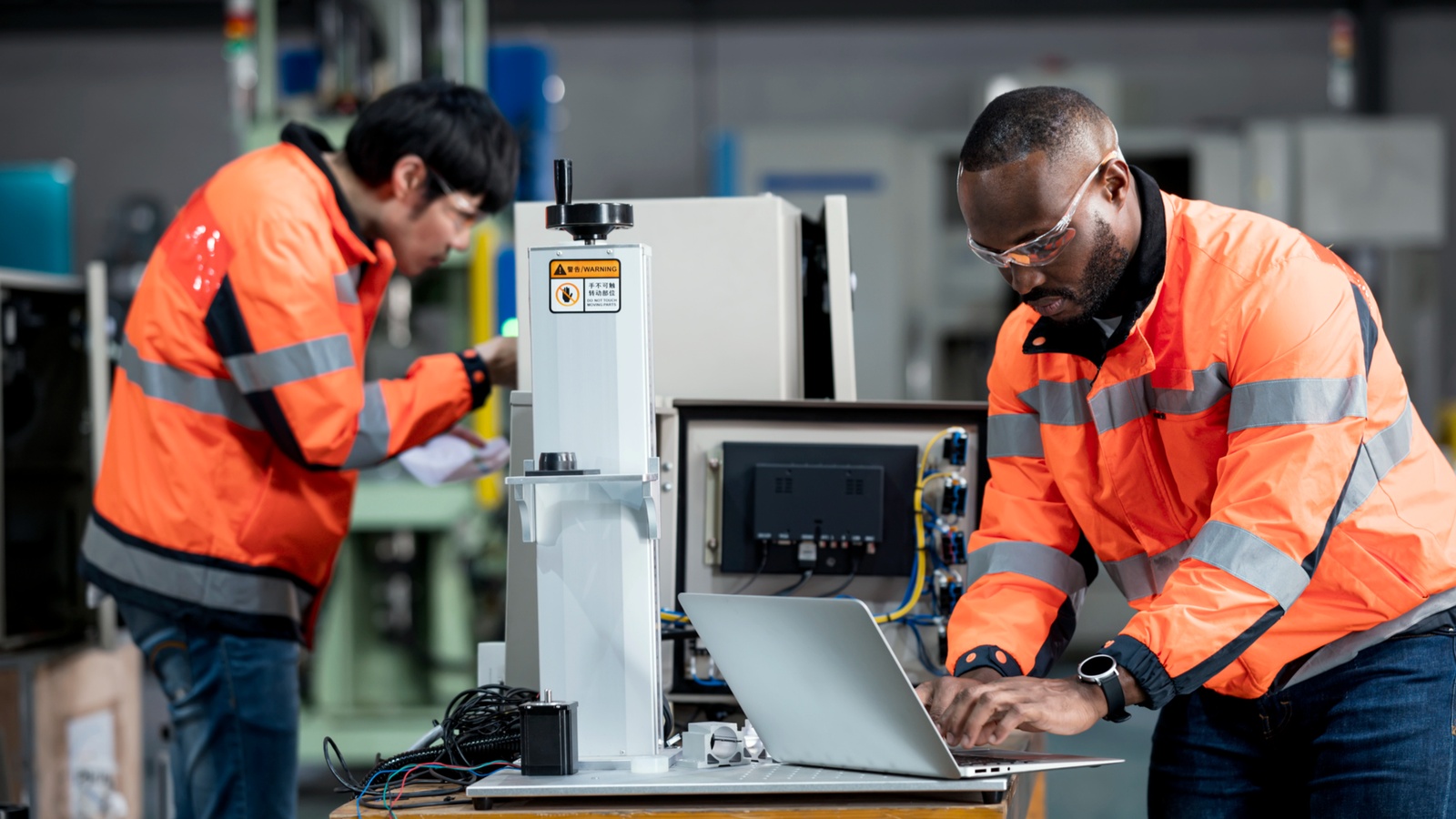
The Federal Trade Commission is proposing to ban noncompete agreements, but doing so would disrupt the operations of most manufacturers, according to the findings of a recent NAM poll.
What’s going on: In February, the NAM polled manufacturing leaders to learn their thoughts on the impact of the FTC’s proposed rule, which would prohibit employers from imposing noncompete agreements on employees. Among the poll’s key takeaways:
- Approximately 70% of respondent manufacturers use noncompete agreements.
- The ban would cause a disruption for approximately 66% of manufacturers.
- The majority of manufacturers—about 89%—said they use noncompetes that last from six months to two years.
- Approximately half of manufacturers polled said a ban would have a negative impact on their investment in training and related programs.
Why it’s important: “Manufacturers use noncompete agreements only for select workers handling their most sensitive information, which cannot be allowed to fall into competitors’ hands,” said NAM Vice President of Infrastructure, Innovation and Human Resources Policy Robyn Boerstling.
- “These agreements are critical for protecting intellectual property. Banning them would force companies to completely change the way they operate and the way teams work together—disrupting workplaces, jeopardizing their ability to develop important new products and ultimately hurting customers.”
What should be done: If the FTC insists on moving forward with a noncompete rule, it should withdraw its current proposal and put forth a more tailored version “with exemptions clearly articulated and justified for the public’s consideration,” NAM Director of Labor and Employment Policy Brian Walsh told the agency.
NAM Applauds Congressional Focus on Key Manufacturing Tax Provisions
New Bipartisan, Bicameral Bill to Address Interest Deductibility Introduced Today
Washington, D.C. – Following the American Investment in Manufacturing (AIM) Act, bipartisan, bicameral legislation that would reinstate the Earnings Before Interest, Tax, Depreciation and Amortization (EBITDA) measure for U.S. businesses, National Association of Manufacturers President and CEO Jay Timmons released the following statement:
“America’s leadership in the world and our ability to defend American values depend on a strong and thriving manufacturing industry. The AIM Act will strengthen our ability to make critical investments in machinery and equipment while protecting more than 450,000 American jobs,” said Timmons. “We thank the bipartisan group of House and Senate members who understand that a competitive tax environment is a key driver to ensure that we can continue to grow and invest in manufacturing in America at this critical time.”
Over the past month, both chambers of Congress introduced legislation to 1) restore the immediate deductibility of research and development costs; 2) reverse the new, stricter limit on interest deductibility; and 3) revise the tax code to restore businesses’ ability to take 100% deductions for equipment and machinery purchases in the tax year of purchase.
“While the U.S. tax code is making it harder for manufacturers to grow, other countries are encouraging industrial investment. For example, China is giving manufacturing companies there a 200% deduction for R&D, while the U.S. only offers a fraction of that. The legislation that’s been introduced can help us turn the tables and make it easier for America to out-innovate China,” Timmons added. “So we’re asking Congress and the Biden administration to make passage of these bills a priority so we can build on the successes that we had following tax reform in 2017, when manufacturers were able to keep their promises and invest in their companies and communities across the board.”
Background:
Research and development: On Jan. 1, 2022, a harmful tax change went into effect that makes R&D more expensive in the United States by requiring businesses to deduct their R&D expenses over a period of years.
Read more about the NAM’s work on this provision here.
Interest deductibility: When manufacturers borrow funds to buy capital equipment, the interest they pay on those loans is tax deductible up to a certain limit. But a recent change in the tax law modified how that limit is calculated—shrinking the deduction for companies that invest in long-lived depreciable assets, making debt financing more expensive and the U.S. an outlier among advanced economies and leaving less capital for job creation and investment.
Read more about the NAM’s work on this provision here.
Full expensing: Under the 2017 tax law, manufacturers were able to deduct 100% of their investments in assets with long, useful lives, supporting their ability to acquire vital equipment and strengthening their competitiveness. However, the ability to deduct 100% of these costs began to phase down at the beginning of 2023 and is set to expire completely in 2027.
See how full expensing has benefited small manufacturers in the United States here.
-NAM-
The National Association of Manufacturers is the largest manufacturing association in the United States, representing small and large manufacturers in every industrial sector and in all 50 states. Manufacturing employs nearly 13 million men and women, contributes $2.90 trillion to the U.S. economy annually and accounts for 55% of private-sector research and development. The NAM is the powerful voice of the manufacturing community and the leading advocate for a policy agenda that helps manufacturers compete in the global economy and create jobs across the United States. For more information about the NAM or to follow us on Twitter and Facebook, please visit www.nam.org.
Timmons Receives Bryce Harlow Business-Government Relations Award
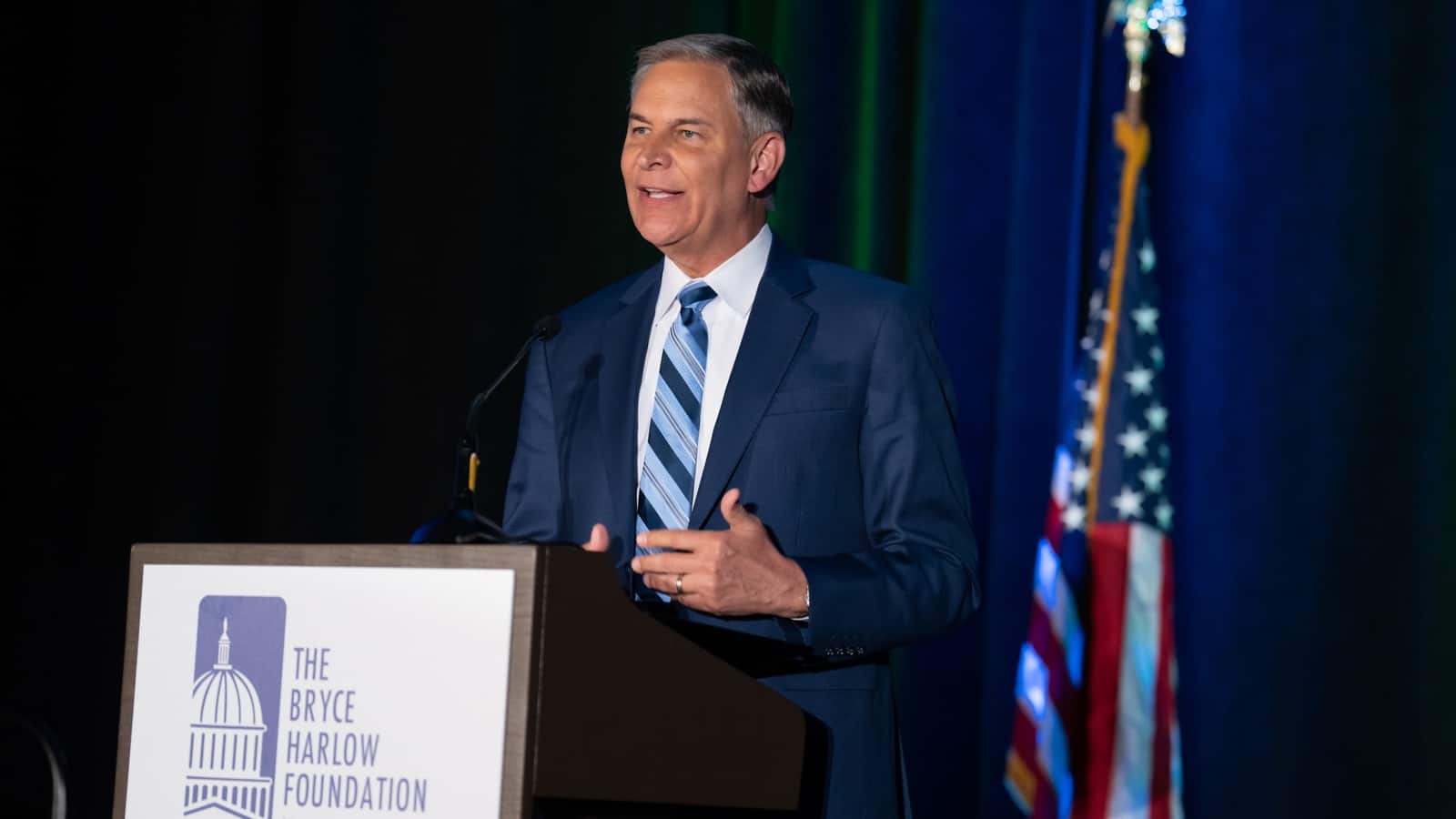
Every year the Bryce Harlow Foundation gives its Business–Government Relations Award to an individual who’s given their all to a career in professional advocacy—and this year, that person was NAM President and CEO Jay Timmons.
Honorees: On Wednesday evening in Washington, D.C., the foundation held its 42nd Bryce Harlow Foundation Annual Awards reception and dinner. The night’s awardees were Timmons and Rep. Debbie Dingell (D-MI), the winner of the foundation’s other honor, the Bryce Harlow Award.
- Timmons was introduced by Dow Inc. Chairman and CEO (and NAM Board Chair) Jim Fitterling, who called the NAM leader “ethical down to his bones” and said, “Jay has a reputation of working honestly and earnestly with Democrats, Republicans and Independents, and he earned that reputation because fundamentally he’s committed to policy solutions that create a win–win, not only for both political parties, but also for American manufacturers and American workers.”
- Dingell also praised Timmons’ steadfast, post-partisan approach to manufacturing advocacy. “He has worked to make sure Democrats and Republicans are part of the discussion about manufacturing and understand how critical it is to this country. … To be honored in the same year as you, Jay, means more than you’ll ever know.”
- In his own remarks, Timmons praised both Bryce Harlow Foundation President Barbara Faculjak’s “outstanding leadership” and Rep. Dingell’s “incredible example for [the next] generation.”
Pep talk: Also honored at the dinner were the 2022–2023 Bryce Harlow fellows, a group of 30 graduate students pursuing careers in advocacy through government relations or lobbying. Timmons spoke directly to them for most of his speech.
- “Over the course of your careers, you will face important decisions,” he said. “You’ll ask yourself questions like, ‘Where should I work?’ ‘What will I do next?’ ‘How much can I make?’ … I want to encourage you to ask another: ‘Why?’”
- “The question matters … because if you can answer honestly and feel yourself standing up a little straighter with a sense of purpose, then you’re in the right profession,” he said. “If your ‘why’ is right … then the ‘what,’ ‘where’ and ‘how much’ will take care of themselves.”
- Timmons went on to tell the fellows part of his own story: how he dropped out of college to move to D.C. and “join the Reagan Revolution”—against his parents’ wishes. But even then he was able to answer his own “why.”
The manufacturing “why”: For the NAM, the organizational “why” is “to advance the values of free enterprise, competitiveness, individual liberty and equal opportunity.”
- Timmons told the students that part of their jobs “as advocacy leaders” would be to defend democracy, now under attack in Russia’s war against Ukraine and elsewhere in the world. While not perfect, Timmons said, democracy has done more to improve people’s quality of life than any other system in history.
Your authentic self: “[T]here was always something or someone who told me to change course or that I wasn’t right for a job—including those voices that told me to pack it up when I was outed as a gay man at a time when that wasn’t exactly an asset for a career,” Timmons said. “If I’d listened, I wouldn’t be here.”
- Today Timmons is the president and CEO of the country’s largest manufacturing association and is happily married with three children.
- “So bring your authentic self to the table,” he concluded. “Soak in all the knowledge and wisdom you can from others. But ultimately, have confidence in your own inner voice, your own judgment and your own vision.”
Click here for Timmons’s full remarks.
NAM Urges Rejection of PRO Act

The NAM is opposing the reintroduction of legislation that would institute “card check” and other labor policies harmful to manufacturers.
What’s going on: A coalition of nearly 100 organizations including the NAM urged Congress last week to reject the Protecting the Right to Organize Act, introduced in the House in February by Rep. Robert C. Scott (D-VA).
- “This bill would limit workers’ right to secret ballot elections, trample free speech and debate, jeopardize industrial stability, threaten vital supply chains, limit opportunities for small businesses and entrepreneurs, cost millions of American jobs and greatly hinder the economy,” they told Congress.
What’s in it: This legislation would significantly worsen—not improve—conditions for employees, the coalition argued. It would:
- Limit workers’ free speech and remove the right to vote via secret ballots.
- Hand confidential worker information over to unions without employee consent.
- Allow unions to choose bargaining units that maximize their chances of winning elections.
- Eliminate right-to-work laws.
- Allow intermittent strikes and remove bans on unions boycotting companies that do business with those engaged in an active labor dispute.
The cost: “The economic impact of the PRO Act would be catastrophic,” the coalition continued, citing one study which “found that the bill’s independent worker reclassification provision alone could cost as much as $57 billion nationwide, while the joint-employer changes would cost franchises up to $33.3 billion a year, lead to over 350,000 job losses, and increase lawsuits by 93%.”
In the spotlight: Many provisions of the PRO Act were raised during a hearing Wednesday of the Senate Health, Education, Labor and Pensions Committee chaired by Sen. Bernie Sanders (I-VT)—demonstrating that this issue and this legislation will remain a top priority for him and others in the Senate.
Timmons Meets With Leaders in Brussels and Paris

The NAM wrapped up its “Competing to Win” Tour in Europe with key meetings in Brussels and Paris, cementing important partnerships and building consensus on the imperative to strengthen U.S. alliances with European nations. It also advocated policies that will enable manufacturers to withstand geopolitical risks and threats to global stability.
Brussels power meetings: In Brussels, the epicenter of EU political activity, NAM President and CEO Jay Timmons met with a who’s who of experts deeply involved in trade and economic policy. He touched on a wide range of priorities including free trade agreements, permitting reform in the United States, IP, energy security and regulatory certainty.
- Timmons met with top trade policy leaders in the EU, including Tomas Baert, a trade adviser to European Commissioner Ursula von der Leyen, and Member of European Parliament and Chairman of the Trade Committee Bernd Lange.
- The team also met with BusinessEurope, led by Director General Markus Beyrer and Deputy Director General Luisa Santos, and participated in a roundtable organized by BDI Brussels Head of Office Heiko Willems. The roundtable also included some of BDI’s leading German member companies.
Evening event: The finale of the day in Brussels was a reception co-hosted by NAM Council of Manufacturing Associations member Distilled Spirits Council at the residence of U.S. Ambassador to the EU Mark Gitenstein.
- Timmons and NAM Vice President for International Economic Affairs Ken Monahan discussed the U.S.-EU relationship and the NAM’s priorities with key EU leaders on trade, including European Parliament members Reinhard Hans Bütikofer and Radek Sikorski.
French connection: In France, Timmons met with the ardent champion of manufacturing Benoit Bazin, chief executive officer of Saint-Gobain, one of the world’s largest building materials companies and the manufacturer of innovative material solutions. In North America, Saint-Gobain has approximately 150 locations and more than 15,000 employees.
- The NAM also visited AmCham France. Managing director Eglé de Richemont said following the meeting: “Today, AmCham France had the privilege to welcome three top representatives from the [NAM] to discuss over key themes, including the importance of close economic partnership between the U.S. and France, the criticality of resilient manufacturing in the U.S., France and across Europe and the importance for manufacturers of standing with Ukraine now and tomorrow for the rebuilding of the country.”
The final word: After meeting with other manufacturers on the final leg of his tour, Timmons remarked “We’ve been hard-charging now for almost two weeks, and it’s truly inspiring how unified our partners across the Atlantic are in their solidarity with Ukraine and in meeting this moment with not just talk but also action. We’re just getting started.”
Timmons Talks Trade, Economy and Jobs
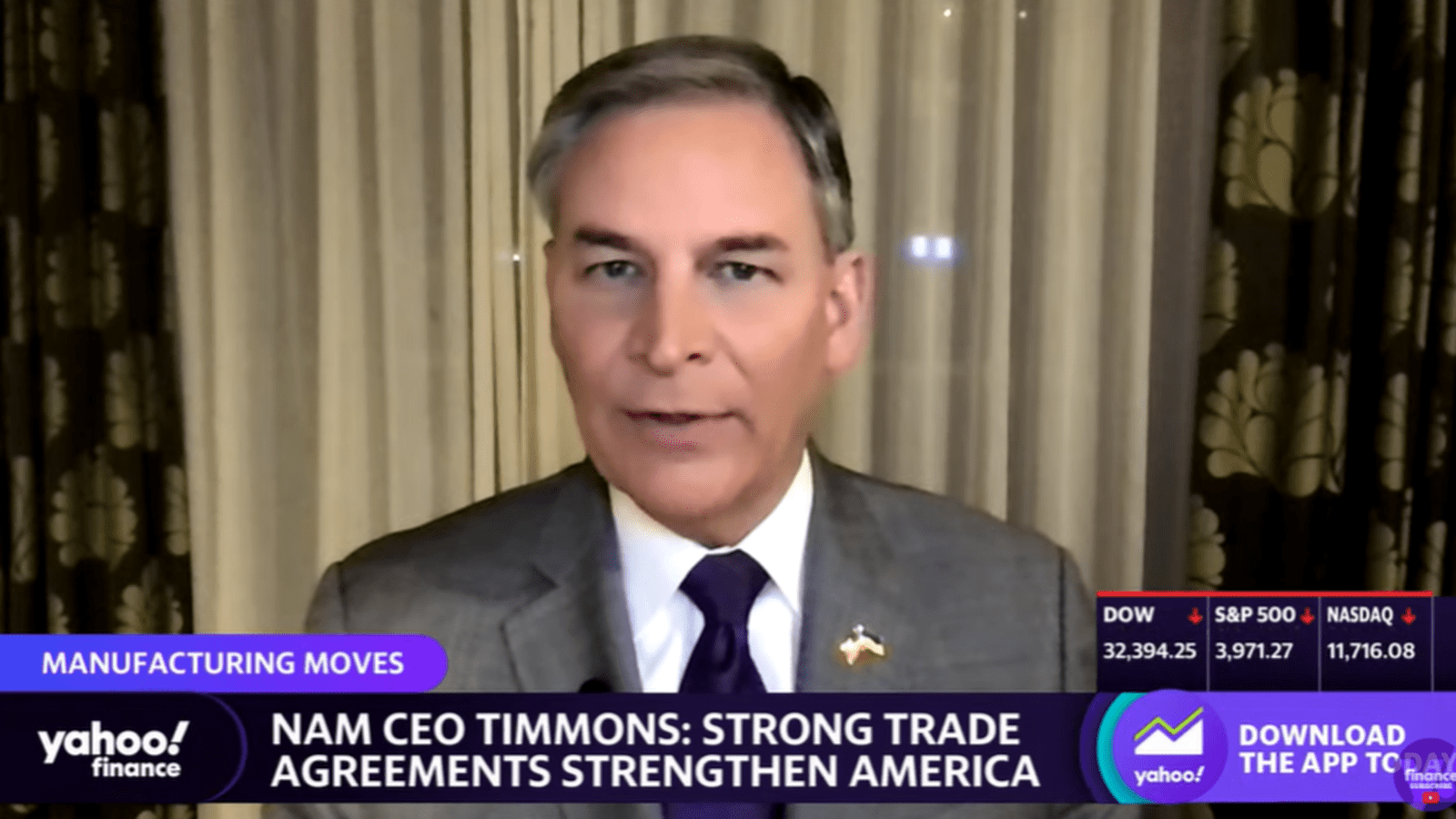
Solid international relationships will see us through any crisis, and artificial intelligence will add jobs to manufacturing, not remove them. Those were just two of the messages driven home by NAM President and CEO Jay Timmons during a Yahoo! Finance interview this week.
- Timmons gave the interview after a busy few days in London as part of the Competing to Win Tour in Europe, where he met with U.K. leaders and the U.S. ambassador to discuss strengthening the U.S.–U.K. alliance.
Trade deal needed: To ensure future manufacturing competitiveness, the U.S. needs a “robust agenda” from the Biden administration—now, said Timmons.
- “We haven’t seen a trade deal negotiated in our country or with our country for four presidencies,” continued Timmons. “We’re growing manufacturing in the United States thanks to the 2017 tax reforms, thanks to the infrastructure investment legislation, thanks to the CHIPS and Science Act.”
- “But … 95% of the world’s customers live outside of the United States. And we can strengthen our supply chains and we can also sell our products if we have the right trade agreements in place.”
Uniting to solve problems: Reinvigorating historic alliances is crucial to overcoming “any obstacle,” said Timmons.
- “[W]e want to make sure that our allies are … able to work together to solve some of these big macroeconomic issues, whether it’s a banking crisis or whether it’s increasing trade opportunities,” Timmons said.
AI: Meanwhile, AI will only expand and improve workers’ jobs, not replace human beings, Timmons said.
- AI is “going to [have] an incredibly positive impact on the sector because it is going to enhance manufacturing capability and output and it’s going to be a supplement to jobs all across the world,” Timmons said.
- “Think about all the technological advances we’ve had over the course of the last few decades, but especially the last five to 10 years. All of these advances have given additional capabilities to the workers.”
Filling jobs: Also needed is a strong workforce. Timmons discussed some of the findings of the NAM’s test Manufacturers Survey, in which nearly 75% of manufacturers cited attracting and retaining quality employees as a top challenge.
- He touched on some of the many initiatives of the Manufacturing Institute, the NAM’s 501(c)3 workforce development and education affiliate, to shore up labor force participation. These include second chance hiring, Creators Wanted—which seeks to inspire tomorrow’s workforce—and more.
The last word: “And that takes this full circle,” Timmons said. “Young people are learning new skills when it comes to technology. Robotics, artificial intelligence, augmented reality, all of those things are what modern manufacturing is all about. And the next generation are the ones that are going to deliver for us.”
NAM to EPA: Don’t Change NAAQS Standards
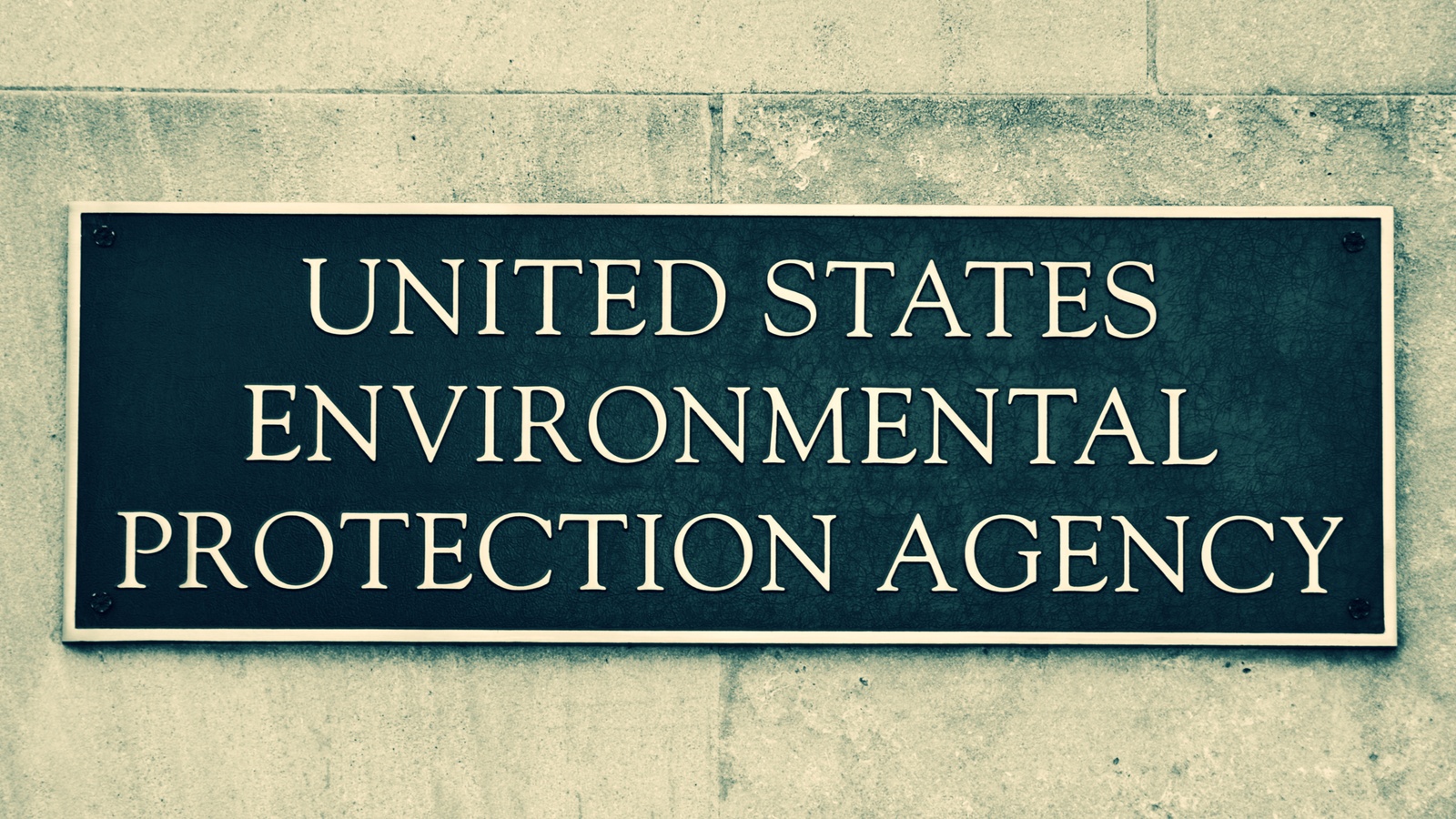
The NAM continues to push back against proposed revisions to the National Ambient Air Quality Standards for particulate matter.
What’s going on: On Tuesday NAM Director of Energy and Resources Policy Chris Morris urged the Environmental Protection Agency to withdraw its recent proposal to lower the primary annual particulate matter standard from 12.0 µg/m3 to between 8.0 and 10.0 µg/m3.
The big picture: “Manufacturers in the U.S. have become leaders in environmental stewardship and sustainability,” Morris pointed out.
- “Across the board, levels of major pollutants have declined dramatically, and the United States is outpacing our global competitors in air quality improvements,” he said.
- “According to the EPA, the U.S. has reduced six common NAAQS pollutants, including PM5, by 78% between 1970 and 2020. Additionally, the EPA data show that PM2.5 air quality has improved 43% between 2000 and 2020.”
The new regulations: The EPA’s new standards would impose a substantial economic burden on manufacturers, Morris continued.
- “First, there is the direct economic exposure manufacturers will face, which is a measure of the gross value added or employment in the manufacturing sector that could be affected or [placed] at risk,” he said.
- “Second is the indirect economic exposure of manufacturing as a result of a stricter PM5 standard. This refers to the effects on the sector as the consequences are felt throughout the supply chain due to decreased overall investment.”
By the numbers: The EPA has estimated the total cost of the controls required for compliance with the proposed standard at up to $1.8 billion—and that figure could go higher, the agency admitted.
- This expensive policy will lead to job losses and fewer new manufacturing facilities, as well as fewer modernizations and expansions to existing facilities, Morris continued.
Unattainable standards: What’s more, some areas in the U.S. are “in non-attainment” with the current PM2.5 standard, so a stricter standard will only put them further out of compliance, Morris told the EPA.
What should be done: To keep U.S. manufacturing competitive and to safeguard well-paying jobs, Morris said, the EPA should maintain the current annual particulate-matter standard of 12.0 µg/m3 and withdraw its proposal.
The NAM in action: The NAM has been rallying manufacturers across the country to speak out against the EPA’s proposal and calling on Congress to oppose these harmful regulations.
- During the 2023 State of Manufacturing address last month, Timmons announced the launch of a nationwide campaign to maintain these standards in order to protect manufacturers.
Manufacturers: Permitting Reform Boosts Our Competitiveness
Timmons: Amid global threats, bill reduces our dependence on bad actors and ensures we can support our allies
Washington, DC – In advance of today’s scheduled vote in the U.S. House of Representatives on H.R. 1, the Lower Energy Costs Act, National Association of Manufacturers President and CEO Jay Timmons released the following statement:
“America’s economy, our institutions and our values are being challenged by threats from around the world, which means now is the time to strengthen our energy security and expand domestic manufacturing—both to reduce our dependence on bad actors and to ensure we can support our allies. This bipartisan action to modernize permitting reform would help us achieve these goals by speeding up critical energy, infrastructure and manufacturing investments while we continue our commitment to environmental stewardship,” said Timmons. “I am in Europe right now, witnessing firsthand the consequences of being overly reliant on a country like Russia for energy. In the 21st century, there’s no excuse for letting job-creating projects languish for years to get bureaucratic approval. The Lower Energy Costs Act will bolster manufacturers’ competitiveness in America while also bringing relief to American families and businesses. We thank Speaker McCarthy, Majority Leader Scalise and Majority Whip Emmer for designating this bill as their top priority and for their focus on ensuring our industry can continue providing the leadership our country and our world need.”
Background: In the NAM’s latest Manufacturers’ Outlook Survey, more than 74% of respondents said that permitting reform—which would simplify and speed up the approval process for new projects—would be helpful to their manufacturing company, allowing them to hire more workers, expand their business or increase wages and benefits.
-NAM-
The National Association of Manufacturers is the largest manufacturing association in the United States, representing small and large manufacturers in every industrial sector and in all 50 states. Manufacturing employs nearly 13 million men and women, contributes $2.81 trillion to the U.S. economy annually and accounts for 55% of private-sector research and development. The NAM is the powerful voice of the manufacturing community and the leading advocate for a policy agenda that helps manufacturers compete in the global economy and create jobs across the United States. For more information about the NAM or to follow us on Twitter and Facebook, please visit www.nam.org
The NAM Revives High-Level U.S.–U.K. Talks
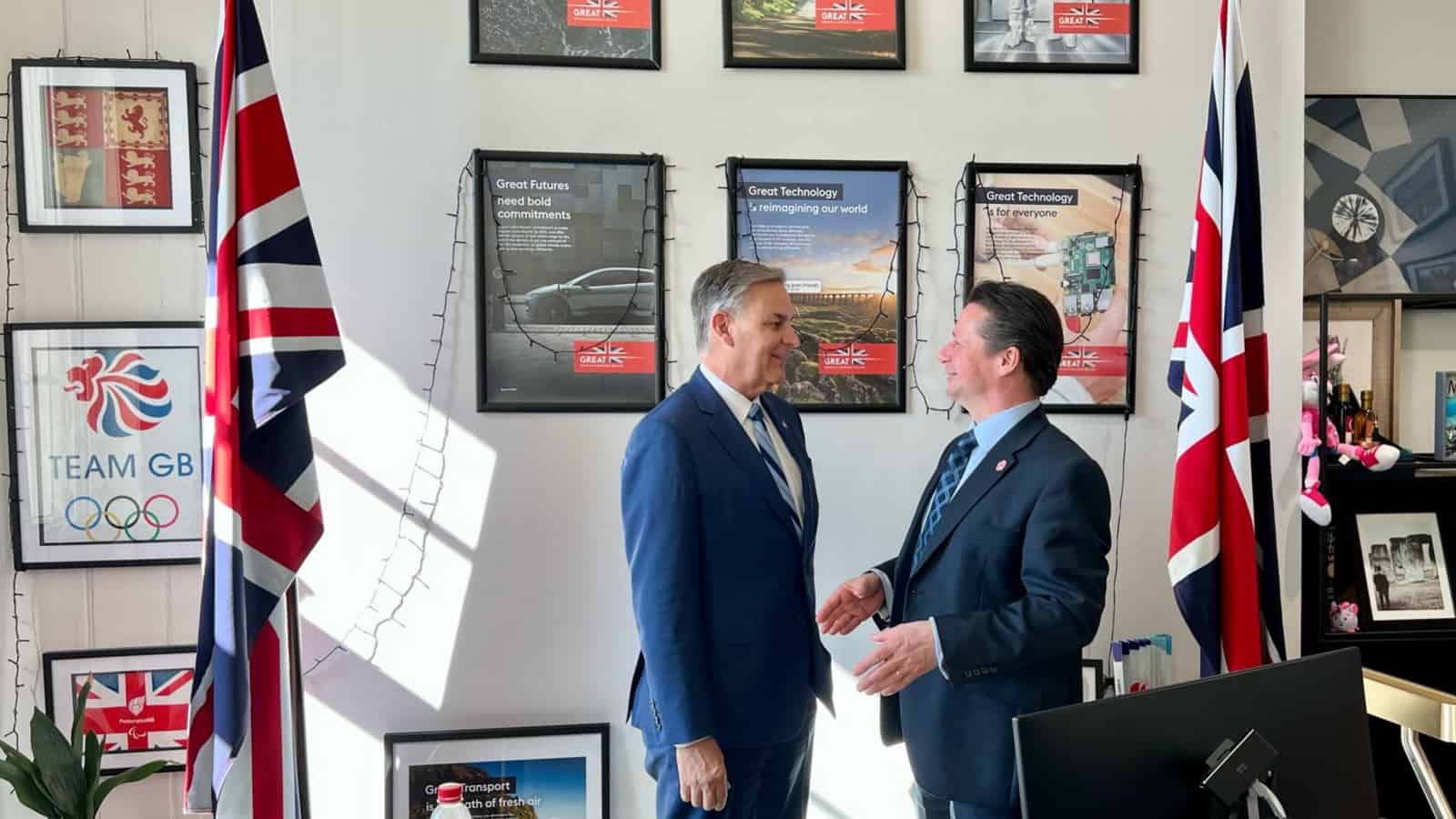
The NAM’s Competing to Win Tour in Europe moved on to London early this week, highlighting the imperative to shore up the U.S.–U.K. relationship—and to urgently address other barriers, like permitting reform and workforce shortages, to enable the U.S. to help allies in the face of Russian aggression and other geopolitical threats.
The issue: Russia’s unprovoked war in Ukraine, the aftermath of the worldwide pandemic and China’s quest for global leadership create a new urgency for expanded trade opportunities between democratic countries.
- The U.S. and the U.K. must work together to shore up supply chains, enhance energy security, boost resiliency and create growth, as NAM President and CEO Jay Timmons emphasized.
The details: Timmons crisscrossed London on Monday and Tuesday, promoting the manufacturing industry and reinforcing its priorities with senior government ministers and officials, including:
- Nigel Huddleston MP, the U.K. minister of state for international trade
- Jonathan Reynolds, Labour Party shadow business secretary (one of the architects of the Labour Party’s industrial plan)
- Jane Hartley, U.S. Ambassador to the Court of St. James’s
Support at home: During his visit, Timmons did an interview with CNN International to discuss the NAM’s new Outlook survey, which found that 77% of manufacturers want to see more trade agreements with Europe.
Making industry connections: At the NAM’s sister organization Make UK, Timmons joined a roundtable with CEO Stephen Phipson and addressed some of Britain’s leading manufacturing companies.
- He spoke about how the U.S. and the U.K. can unlock new trading opportunities going forward and bolster democracy by strengthening commerce.
- The two groups also reaffirmed their commitment to share market intelligence, data and policy work, as well as to facilitate visits for economic delegations promoting trade, investment and commercial opportunities.
- They also voiced their continued and mutual support of the Ukrainian people and of the democratic institutions in their own countries.
What they said: “The ties between the UK and United States go back a long way and we have significant political, economic and trade connections,” said Phipson. “Relations with the US are vital and its market is the second most important for UK goods. In a post-Brexit world, it is likely to assume ever greater importance as part of our efforts to boost global trade.”
- “As world events have made abundantly clear, strengthening democracy, the free enterprise system and strategic alliances in our countries and around the world is essential to our future and the fight against tyranny,” said Timmons. “As the U.S. and the U.K. take steps to build a stronger, more open and secure economic relationship, the NAM urges our leaders to move toward a new U.S.–U.K. market-opening trade agreement that includes strong, clear and enforceable outcomes.”
Meeting manufacturers: In addition, Timmons met with manufacturers that have operations or pending operations in both the U.K. and the U.S. Energy security and regulatory certainty, as well as the worker shortage in the industry, also took center stage in these discussions.
Bottom line: “The tour’s time in London matters to manufacturers in the United States because it strengthens the ‘special relationship’ between the U.S. and the U.K. and boosts the prospects for enhanced cross-Atlantic trade, supporting manufacturing jobs in both countries,” said Ken Monahan, NAM Vice President of International
Timmons Finishes First Week in Europe
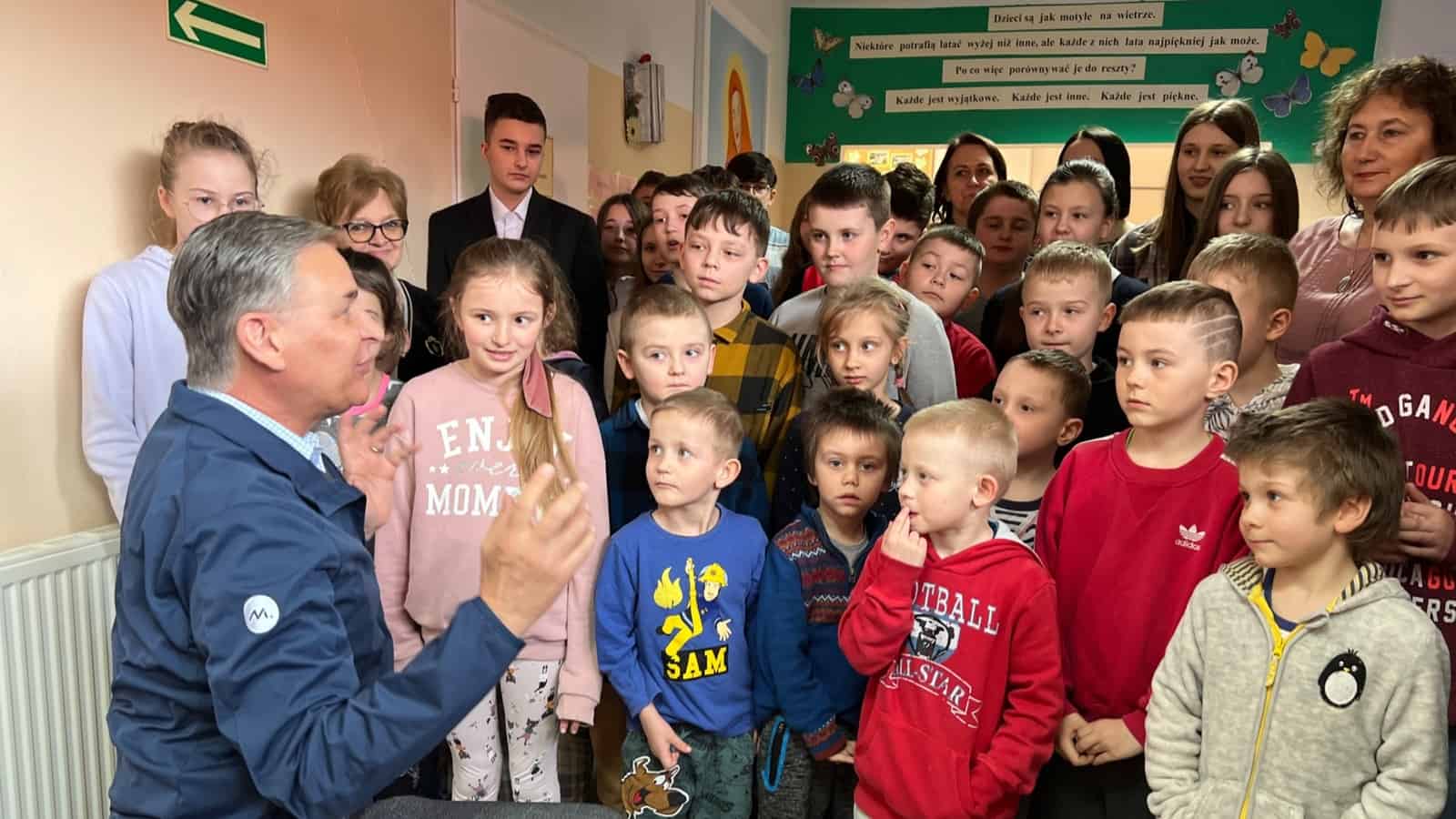
NAM President and CEO Jay Timmons concluded week one of the Competing to Win Tour in Europe by visiting a Polish school supported by UPS as well as a Pratt & Whitney facility, where he reflected on the role of manufacturing in protecting democracy.
The school: Timmons visited the elementary school in Lipa, Poland, which has been supported by UPS and served as a safe haven for Ukrainian refugee children at the start of the war.
- During his visit, Timmons discussed the needs of the children and met with the students and teachers in the town, which is near the Ukrainian border.
- He also met with an administrator from a sister school on the Ukrainian side of the border to discuss how the children there are faring.
“Arsenal of Democracy”: In addition, Timmons visited the Pratt & Whitney manufacturing campus in Rzeszów, which employs 5,000 workers and manufactures commercial and defense equipment.
- Timmons not only got a firsthand look at a company that is reinforcing the U.S.–EU commercial relationship, but also learned about the company’s response to the Ukrainian refugee crisis, which includes team members providing housing, aid and volunteer hours.
Visiting Auschwitz: Timmons visited the concentration camps at Auschwitz-Birkenau on Saturday and saw the horrific evidence of the atrocities committed at the site, where more than 1.1 million people perished.
- Following the visit, he warned against the dangers of authoritarianism and the importance of standing up for democracy and common values of respect and decency. He also noted, as highlighted during the Auschwitz-Birkenau tour, that businesses acquiesced or participated in mechanisms that advanced the aims of the Axis powers.
- Timmons emphasized manufacturing’s power to improve lives and protect freedom for people around the world. However, he also noted the dangers of command-and-control governments dictating the industry’s aims, citing the Holocaust and World War II as examples of how manufacturing can be used as a malevolent force.
The last word: “The American business community has an obligation to stand up for our democratic system and to hold our leaders responsible for their actions—and their rhetoric,” said Timmons.
- “Manufacturers in America, in particular, are a force for good. But we must never let our guard down or take our democracy for granted, no matter how difficult it may be to uphold what is right in the United States and around the world.”
Next up: The tour continues this week, with Timmons visiting high-level government and industry leaders in London, Brussels and Paris.
